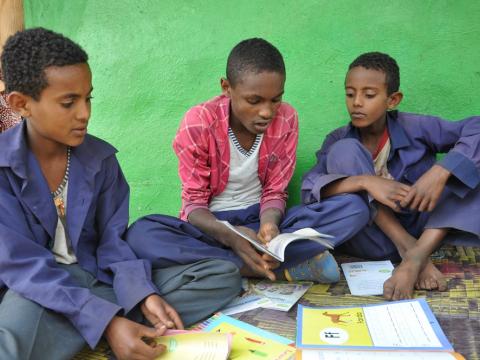Reading Buddies help children learn to read through friendship

“When I was in the lower grades, I had difficulty reading,” says 16-year-old Giduma. “Unlike my brothers I started reading late.”
Giduma is currently a grade 8 student in the Nono district of Ethiopia, over 100 km from Addis Ababa. Giduma is the oldest of five children. He has two younger brothers and two younger sisters.
“It was a struggle for me to catch up with my colleagues,” Giduma continues. “As a result of this, I wanted to support my siblings and other children in our village.”
Reading Buddies are older students who have been identified by teachers and volunteers as having good reading and writing skills.
Although he used to have trouble reading, he’s now known for his academic performance in school. He recently ranked first in his class. Giduma was also chosen to be one of Reading Buddies in his community.
Reading Buddies are older students who have been identified by teachers and volunteers as having good reading and writing skills. They are often assigned to help their younger siblings at home. Reading Buddies are one of the community action components in the Literacy Boost programme.
Giduma volunteers at the local reading camp, helping children from the community strengthen their literacy skills through fun activities. (Photo credit: Meron Belay / World Vision)
“I was very happy when I was chosen as a Reading Buddy. Using various books that are provided by World Vision, I am helping my siblings learn how to read and write. I ask them questions about the stories we read, and I encourage them to remember each and every letter and word.”
“Identifying letters and reading was very difficult for me,” says Giduma’s 14-year-old brother, Wakuma. “I could not read until I finished grade 2. Because of this I used to answer exams by guess. Now we practice reading with Giduma at home. He reads stories for us and helps us to read like him.”
“I was very happy when I was chosen as a Reading Buddy," says 16-year-old, Giduma.
Wakuma is not only reading at home, but his new skills are paying off in the classroom. He’s improved his grades and now ranks fourth in his class. Next year, Wakuma hopes to be first in his class, just like Giduma.
Giduma’s siblings also attend a Literacy Boost reading camp on weekends. Reading camps provide safe, fun, informal literacy lessons to children to support the reading and writing skills they build at school and work with Reading Buddies.
“I am very happy seeing my children’s academic improvements,” says the boys’ mother, 28-year-old Bekelu. “Previously, even though we sent our children to school, they could only identify some letters and could not read. My husband and I did not have time to help them. After they started attending reading camps and studying with their brother at home, I have seen great progress in all of them. Their classroom ranks have improved.”
Giduma's 8-year-old sister, Keneni, is also learning to read with his help. (Photo credit: Meron Belay / World Vision)
Bekelu and her husband have also provided space in their home for their children to practice reading. They call this their “reading corner” which is decorated with books the children have borrowed from their reading camp, and also with arts and crafts they’ve created at the reading camp.
By helping his brothers and sisters learn to read, Giduma has also benefited. “I enjoy reading these books. It is helping me improve my reading habits a lot,” says Giduma.
Snapshot: Literacy Boost in Nono District, Ethiopia
- Literacy Boost was implemented in the Nono District of Ethiopia in 2014
- Over 9,000 students in the district attend 91 reading camps
- 169 new book titles have been created in two languages
- In cooperation with the local government, World Vision plans to incorporate the Reading Buddies system at schools across the district

